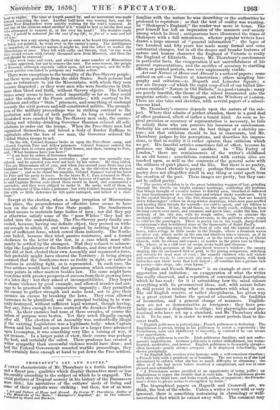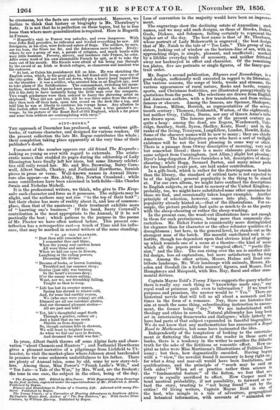THORNEURT'S ART AND NATURE. * hr - onzAT characteristic of Mr. Thornbury is
a fertile imagination and a fluent pen ; qualities which display themselves more or less favourably according to the subject on which he is engaged. The vivid pictured of Tropical seenery in his -history of the Buccaneers Were rich ; his narratives of the otitlawe' mode of living and some of their exploits were striking : but then, few of us were • Art and Nature at Nome Tr
and Abroad. By George W. ThornbUry, Author of
/W
" 1Eorths of the Main," 8frakopere's England," 4-e. In two volumes. Published by Hurst and Blackett. familiar with the nature he was describing or the authorities he professed to repicoduee ; so that the test of reality was wanting. In " Shakspere's England," the readeewas more at home, The poet hiniself has left' an impression'of the manners and', society among which he lived ; antiquarians have illustrated the times of Shak,spere with a full minuteness whence popUlar writers have
drawn a large amount' of " gener:il information" : the lapse of two hundred and fifty years has made many forinal and some substantial changes, but in all the deeper and broader features of
nature and human- character the England of Victoria is really the England of Elizabeth. Hence; M'. Thornbuils carelessness in particular facts, the eXtiggeratioxi if not untruthfuln.ess of his general representations, and the sacrifice of accuracy to startling effects or-pointed periods, was very unpleasantly visible, Art and 'Nature at Home and Abroad is a series of papers ; some' critical on art—as Te-niers at Amsterdam.; others mingling .bio- graphy and criticism—as • Efogarth and Leicester Squara; a
few are literary—of which the rapid coup-dreed of our ballad lite- rature entitled Nature in Old Ballads,' is a good example ; many are purely fanciful, the theme of the school transmuted into. the magazine article—such are Beggars, and the Witchery of London. There are also tales and sketches, with several papers of a miscel- laneous kind.
Mr. Thornbury's success' depends upon the nature of the sub- ject. Where that admits of perfect abandon thefts is a good deal of effect produced, albeit of rather a tumid kind. As soon as lo- gical precision or accuracy of representation is necessary, he fails to satisfy those who can perceive his looseness' or carelessness. Probably his art-criticisms are the best- things of a sketchy na- ture; not that criticism should- be lax or maeeurate, but Mr. Thornbmy judges by his perceptions, and describes his impres- sions, so that in reality it is rather opinion than criticism which we get. His fanciful articles sometimes fail of effect, because he .
professes one thing and: does another:- In "The Poetry of London," there are reminiscences of the writer's childhood in an old house ; associations connected: with certain sites are touched upon, as well as the contrasta of the general noise with the stillness of quiet pladea, and the like. But -there is no poetry, unless a tinsel rhetoric is 'poetry ; perhaps' therecannot be, for' poetry does not altegetlier &yell in any thing Cr exist apart-from the creation of the poet. Therie iniagea are pretty, but they can-' not be called pcietry: "The poetry of London is in the great brimming waggon of iiay; grinding-. through. the streets on bright suthmer mornings, scattering dry perfume that brings thought of country homes to doleful men, bleached or sallowed by long imprisonment at tavern-bars and behind dusty warehouses. It is in the crystal blocks of ice, like Pitt diamonds grown up, that are handed down fishmongers' cellars on sharp winter dawnings, when men pass muffled and beating their breasts- for warmth—too cold to speak, and too lifeless to ' look about them. It lak, in old times, in • the dusty coach; rolling in from its long course over moor, and common, and green lane, under the dim, low archway of the city inn, with its rough ostler, ready to criticize the smoking cattle—and the smart maid-servants, in the galleries above ready to criticize the passengers. There is poetry too in the rough, dust-footed countryman's first bewildered stare at the immensity of Saint Paul s. "Poetry, scuttling away from the flood of cabs and the-torre-nt of omni- buses takes refuge in little nooks in the Temple, where a fountain waves its silver rod, which melts in the sun and dissolves into a torrent, as if in emulation of the shining river beyond; or in the brick archway of Christ Church, with its silence and repose ; or nestles- in the green tree in Cheap- side' where, as in a cliff over an ocean, rooks build and clamour. "The sickly geranium at the pale-faced weaver's window; the canary singing, like an enchanted bird of gold, to the pining sempstress, stitching gay shrouds for dead men of rank ; the squalid children who sell violets and scentless weeds to care-worn city men ; sham countrynien, with dank bulrushes and birds' nests that look unreal; all combine into a picture rich in poetry—into elegy, ode, even hymn."
"English and French Manners" is an example at once of ex- aggeration and imitation ; an exaggeration of what the writer has really observed, and a repetition of conventional descriptions which he has read ; for it is astonishing how the mind colours everything with its preconceived ideas, and, with nature before it, will persist in mixing what it remembers with what it sees. The old English reserve, or rather sheepishness, has given way to a great extent before the spread of education, the facilities of locomotion, and a general change of manners. English- men are not so demonstrative as foreigners ; they have pro- bably as sincere a disposition to oblige ; but playwrights and pro- fessional wits have set up a standard, and Mr. Thornbury sticks to it. To be sure, it is easier to write smart periods than to dis- cover truth.
"English politeness is patronizing ; French politeness is flattering. The. Englishman is proud, trying in his politeness to assert a superiority ; the Frenchman, ram and Indifferent to sincerity, is content if he can secure
your approbation. • • "Scotch politeness is servile. Irish politeness familiar, and not unlie- quently impertinent. German politeness is rather oldfashioned, but warm-
hearted, meditative, and honest. English politeness is frequently abrupt.— often insolent—nearly always arrogant : it is displayed reluctantly, and shown grudgingly. "An English lady receives your homage with a self-eonseiouff erection; a French lady with a gratitude as of humility. The one seems as if she had determined to enforee what she has. 'so much difficulty in obtaining ; the other as if she had never before received a compliment, and was at once pleased and astonished.
"A Frenchman steins gratified -at an opportunity of being. polite ; an' Englishman to regret the trouble that. it costs him. Englishman grams tired after the third bow, and looks vexed, sullen, or impatient; the French- man's desire to please seems to strengthen by habit."
The biographical papers on Hogarth and Cromwell are, We- think, the best of the whole. Unless a writer is very wild or veiy ignorant, there is something restraining in chronology- or well- - ascertained fact which he canna away with The comment may be erroneous, but the facts are correctly presented. Moreover, we ncline to think that history, or biography is Mr. Thornbury's forte. It is not that he is perfection on these topics, but he is less loose than where more generalization is required. Here is Hogarth in France. " Hogarth's visit to France was unlucky, and even dangerous. With true John Bull prejudice, he ridiculed and reviled everything he saw. All foreigners, in his eyes, were fools and eaters of frogs. The soldiers, he says, are too lean, the friars too fat, and the fuihwomen mere leather. Every- where he saw a pomp of war, a parade of religion, and much bustle with very little business. Poverty, slavery, and insolence rule France, he cries. After every word of his own abominable French he spit, as if to take the taste out of his mouth. His Mends were afraid of his being run through by the sword of an Irish or Scotch refugee, so clamorous and insolent was Ins rudeness.
"At last, at Calais his punishment fell on him. He was sketching the English arms, which, to his great glee, he had found still hung over one of the city-gates. He had not well sat down, when a heavy hand tapped him on the shoulder : it was a soldier, who arrested him as an English spy, sent to take plans of the fortifications. The commandant, twitching his mous- tachios, declared, that had not peace been actually signed, he should have felt it his duty to have instantly hung the little man over the ramparts. Two rough gendarmes were then ordered to hurry the shivering artist on shipboard. They did not quit him till he was three miles from the shore ,• they then took off their hats, spun him round on the deck like a top, and told him he was at liberty to continue his voyage home. Any allusion to this foolish affair vexed Hogarth : he, however, took a true painter's re- venge, by his picture of the Roast Beef of Old England, which a fat priest and some lean soldiers are contemplating with envy."



























 Previous page
Previous page